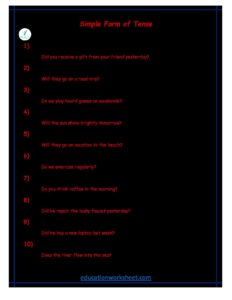how to converting Simple Tense interrogative sentences to positive form
how to converting Simple Tense interrogative sentences to positive form
Table of Contents:
- Understanding Simple Tense Interrogative Sentences
- Why Convert Interrogative Sentences to Positive Form?
- Basic Rules for Conversion
- Conversion of Present Simple Tense
- 4.1. Conversion of Yes/No Questions
- 4.2. Conversion of Wh-Questions
- Conversion of Past Simple Tense
- 5.1. Conversion of Yes/No Questions
- 5.2. Conversion of Wh-Questions
- Conversion of Future Simple Tense
- 6.1. Conversion of Yes/No Questions
- 6.2. Conversion of Wh-Questions
- Conversion of Other Simple Tenses
- Examples and Practice
- Common Mistakes to Avoid
- Conclusion
Understanding Simple Tense Interrogative Sentences:

Simple tense interrogative sentences are questions that seek information. They can be broadly categorized into two types: Yes/No questions and Wh-questions. Yes/No questions can be answered with ‘yes’ or ‘no,’ while Wh-questions seek information about specific details.
Why Convert Interrogative Sentences to Positive Form?
Converting interrogative sentences to positive form is crucial for various reasons:
- Clarity: Positive sentences are more straightforward and concise, making it easier for the reader or listener to understand the intended message.
- Assertiveness: Positive statements convey information with confidence, whereas questions may imply uncertainty.
- Context: In certain situations, it may be more appropriate to present information as a statement rather than a question.
Basic Rules for Conversion:
Converting interrogative sentences to positive form involves several key rules:
- Change the word order: Interrogative sentences often have an inverted word order compared to positive sentences. In the conversion, revert to the typical subject-verb-object order.
- Remove the question word: If the interrogative sentence contains a question word (e.g., who, what, where), eliminate it in the positive form.
- Ensure proper verb tense: The verb tense in the converted sentence should match the original interrogative sentence.
Conversion of Present Simple Tense:
The present simple tense is used to describe actions or states that are habitual, factual, or generally true in the present.
4.1. Conversion of Yes/No Questions:
In the present simple tense, to convert a Yes/No question to a positive statement:
- Change the word order from “Is she studying?” to “She is studying.”
- Remove the auxiliary verb ‘is.’
- Retain the main verb in its base form.
4.2. Conversion of Wh-Questions:
For Wh-questions in the present simple tense:
- Change the word order from “What does he eat?” to “He eats what.”
- Remove the auxiliary verb ‘does.’
- Ensure the verb remains in its base form.
Conversion of Past Simple Tense:

The past simple tense is used to describe actions or states that occurred at a specific point in the past.
5.1. Conversion of Yes/No Questions:
To convert a Yes/No question in the past simple tense to a positive statement:
- Change the word order from “Did they visit the museum?” to “They visited the museum.”
- Remove the auxiliary verb ‘did.’
- Maintain the main verb in its base form.
5.2. Conversion of Wh-Questions:
For Wh-questions in the past simple tense:
- Change the word order from “Where did she go?” to “She went where.”
- Remove the auxiliary verb ‘did.’
- Keep the verb in its base form.
Conversion of Future Simple Tense:
The future simple tense is used to describe actions or states that will happen in the future.
6.1. Conversion of Yes/No Questions:
To convert a Yes/No question in the future simple tense to a positive statement:
- Change the word order from “Will they come to the party?” to “They will come to the party.”
- Remove the auxiliary verb ‘will.’
- Maintain the main verb in its base form.
6.2. Conversion of Wh-Questions:
For Wh-questions in the future simple tense:
- Change the word order from “What will she do?” to “She will do what.”
- Remove the auxiliary verb ‘will.’
- Keep the verb in its base form.
Conversion of Other Simple Tenses:

The process of converting interrogative sentences to positive form remains consistent across other simple tenses, including present continuous, past continuous, and future continuous. You’ll apply similar rules, changing word order, removing auxiliary verbs, and maintaining the verb’s tense.
Examples and Practice:
Let’s explore a few more examples to solidify your understanding:
Present Simple Tense:
- Original Question: “Do you like chocolate?”
- Positive Form: “You like chocolate.”
Past Simple Tense:
- Original Question: “Did she visit Paris last year?”
- Positive Form: “She visited Paris last year.”
Future Simple Tense:
- Original Question: “Will they attend the conference?”
- Positive Form: “They will attend the conference.”
Present Continuous Tense:
- Original Question: “Are they playing soccer now?”
- Positive Form: “They are playing soccer now.”
Past Continuous Tense:
- Original Question: “Was he studying when the phone rang?”
- Positive Form: “He was studying when the phone rang.”
Future Continuous Tense:
- Original Question: “Will she be working late tonight?”
- Positive Form: “She will be working late tonight.”
Practice these conversions to gain confidence in your ability to transform interrogative sentences into positive statements.
Common Mistakes to Avoid:
When converting interrogative sentences to positive form, watch out for the following common mistakes:
- Neglecting to change word order: Ensure that the word order is adjusted from question format to statement format.
- Forgetting to remove auxiliary verbs: Auxiliary verbs like ‘do,’ ‘does,’ ‘did,’ and ‘will’ should be omitted in positive sentences.
- Using the incorrect verb tense: The verb tense in the positive statement must match the original interrogative sentence.

